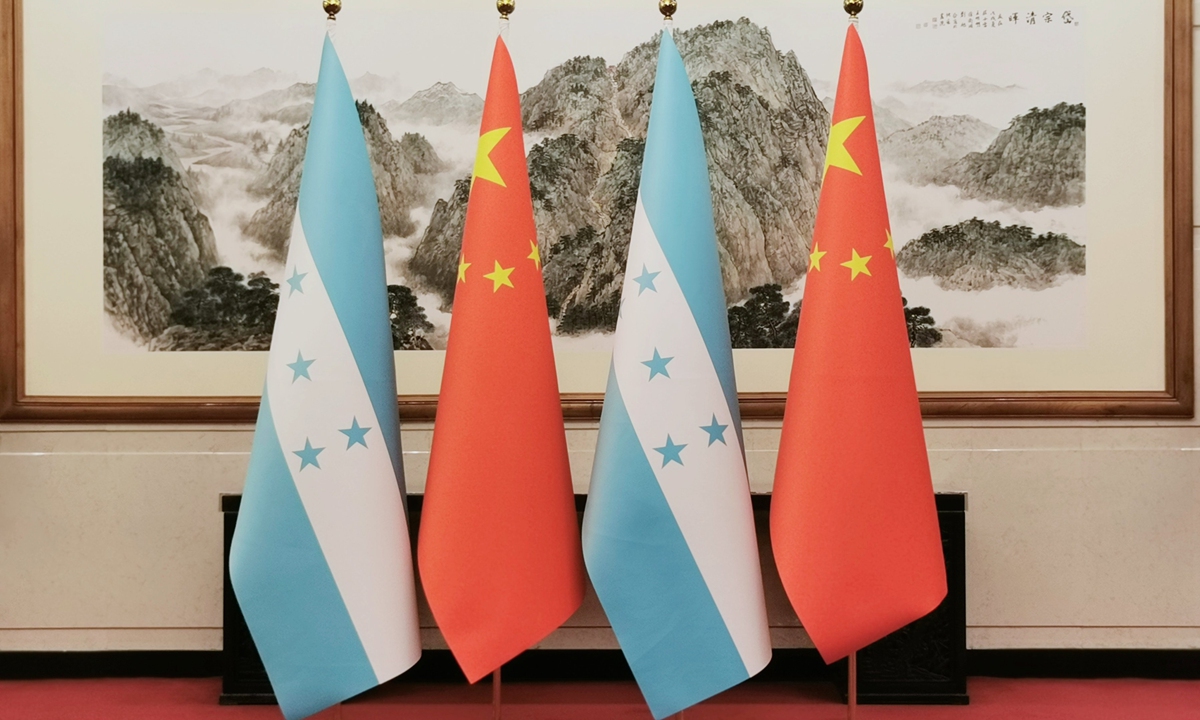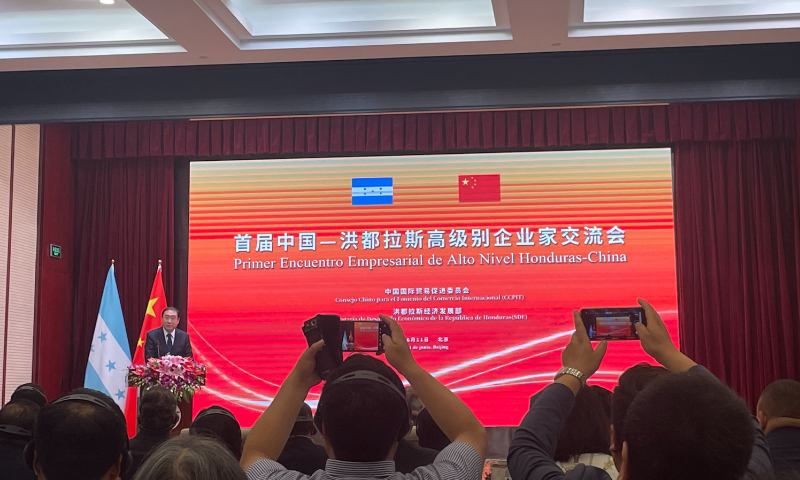
China Honduras photo
Trade cooperation between China and Honduras is strengthening at a rapid pace as agricultural trade, a free trade agreement (FTA) and cooperation under the China-proposed Belt and Road Initiative (BRI) are high on the agenda of the ongoing state visit of Honduras' president to China.
Such fast development, coming just months after the two countries established diplomatic relations, demonstrates that pragmatic cooperation is moving faster than expected, observers said, predicting that more concrete deals will come soon amid increased political trust.
On Sunday, the First China-Honduras High-Level Entrepreneur Exchange Conference was held in Beijing, during which entrepreneurs actively sought cooperation opportunities in agriculture, technology, finance and other areas, as they are eager to learn about each other's policy landscape and market demands.
Melvin Redondo, vice minister for economic integration and international trade of Honduras, took roughly 30 minutes during the Sunday event to explain the country's trade and investment environment, and the advantages of its products, to the Chinese entrepreneurs in the audience.
The vice minister said the country is now deepening trade and investment cooperation with China under the BRI, and the two countries are also discussing a comprehensive FTA.
Nearly 120 Chinese entrepreneurs from various fields such as foreign trade, engineering, finance, telecommunications and tourism enthusiastically signed up to participate in the exchange and engage with Honduran companies, said Zhang Shaogang, vice chairman of the China Council for the Promotion of International Trade (CCPIT), the event organizer.

First China-Honduras High-Level Entrepreneur Exchange Conference in Beijing, on June 11, 2023 Photo: Shen Weiduo/GT
China and Honduras have different resources and strong economic complementarity, with enormous potential for bilateral economic and trade cooperation and broad development prospects, Zhang said on Sunday, proposing that the two sides explore trade potential, promote investment cooperation and enhance infrastructure connectivity.
"We see great potential in infrastructure in the Latin American country, and we have plenty of experience in helping them bridge that connectivity," a representative from a Beijing-based infrastructure company told the Global Times on the sidelines of the event on Sunday.
On Monday, Honduras and China will sign an agreement to establish two working groups to promote the signing of an FTA and cooperation between enterprises, Cerrato disclosed.
"At present, cooperation intentions and progress between the two countries' business communities are mainly concentrated in the agricultural sector, such as exports to China of Honduran coffee, white shrimp, melon and other agricultural products," Fredis Cerrato, Honduran minister of economic development, told the Global Times in an interview on Sunday.
However, in the next stage, Honduras looks forward to further expanding cooperation with China in the areas of investment, energy, telecommunications and infrastructure, Cerrato said.
Honduran President Xiomara Castro is on a six-day official visit to China through June 14, the Xinhua News Agency reported. The first state visit to China by a Honduran president came less than three months after the countries established diplomatic ties following Honduras' decision to sever so-called "diplomatic relations" with China's Taiwan region.
Honduras officially inaugurated its embassy in Beijing on Sunday.
Amid the visit, China-Honduras cooperation on multilateral platforms is also strengthening, as Castro formally requested the country's admission to the BRICS-led New Development Bank (NDB) after she visited the headquarters of the bank in Shanghai on Saturday.
"We believe that we can have all the possibilities here to find mechanisms that allow us to develop our economy, as well as find permanent allies that allow us to give a different quality of life to our peoples," Castro said at the NDB, according to an EFE report.
Joining the NDB will help Honduras increase its financing channels and bring more investment to the country, Tu Yonghong, a professor at the International Monetary Institute at Renmin University of China in Beijing, told the Global Times on Sunday.
"After the accession of Bangladesh, the UAE and Egypt, and the application of Honduras, more developing countries may become members of the NDB, which will make the distribution of international financial resources fairer and more efficient," said Tu.
Since the NDB does not necessarily use the US dollar to provide funds and loans, it can reduce the dependence of developing countries on the dollar, because the choice of borrowing currency should take into full account of financing costs and exchange rate risks, especially the uniformity of borrowing and repayment currencies, Tu noted.
In 2021, trade between China and Honduras grew 67.1 percent year-on-year to $1.62 billion, according to statistics from Chinese customs. As of the end of 2021, Chinese enterprises had signed contracts worth $640 million in Honduras and completed turnover of $700 million, according to the Chinese Ministry of Commerce.





